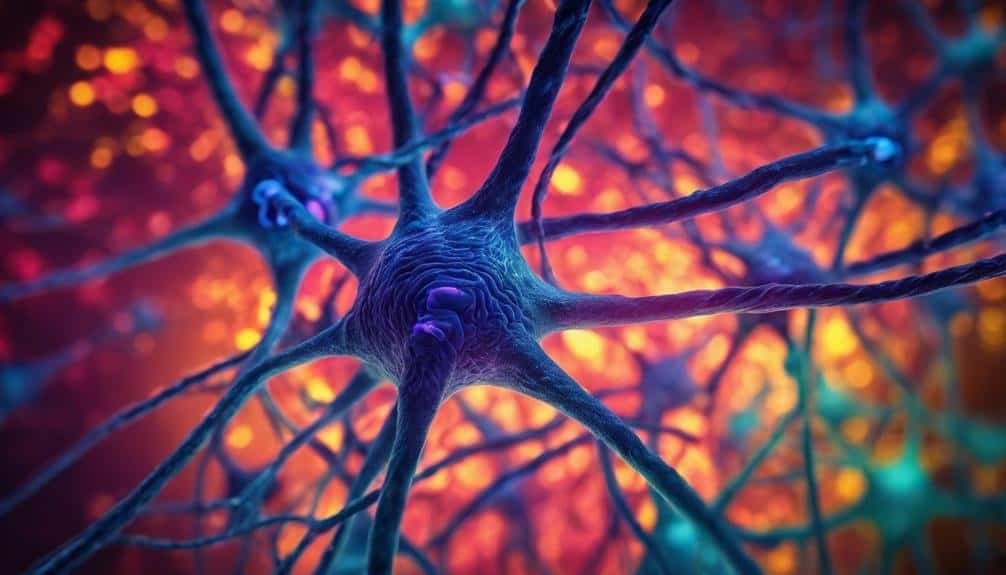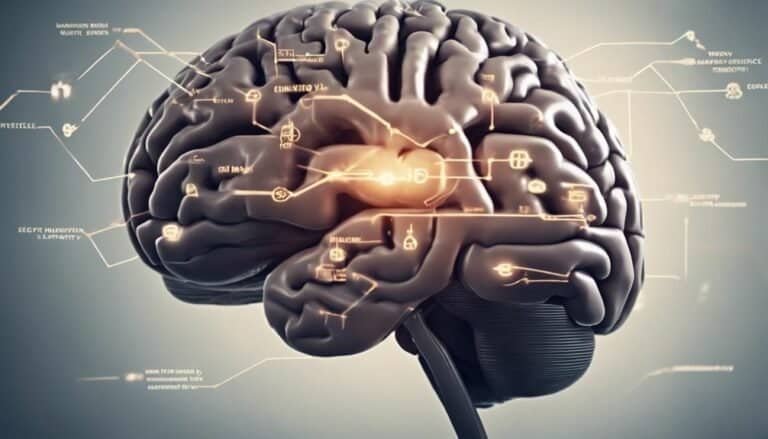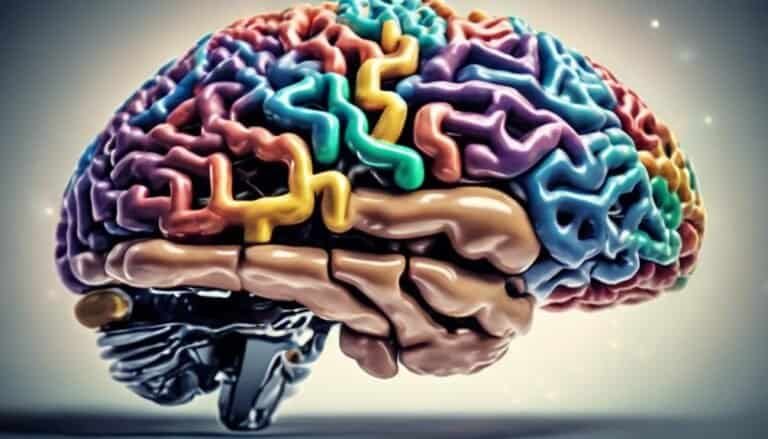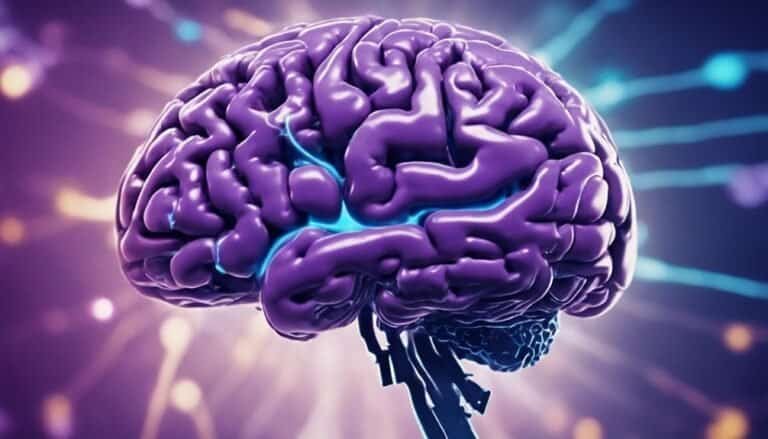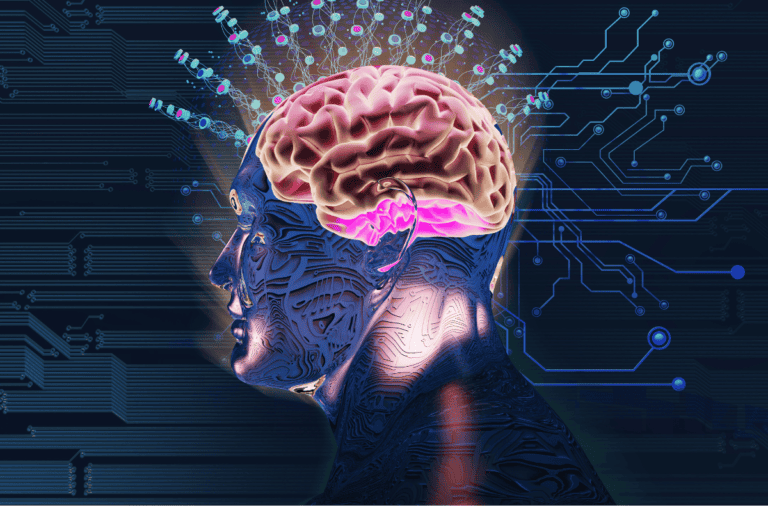Brain Patterns in Successful People
Imagine the brain as a complex network of roads, each leading to a different destination. Have you ever wondered how successful people's brain patterns differ from others?
Understanding the neural pathways of achievement can offer intriguing insights into what sets successful individuals apart. By exploring the intricate workings of the brain in high achievers, we can uncover valuable knowledge that may just hold the key to unlocking your own path to success.
Key Takeaways
- Successful individuals exhibit efficient, flexible, and resilient neural pathways.
- Neural plasticity supports adaptability and learning crucial for success.
- Brain rewiring enhances cognitive performance and adaptive behaviors.
- Adaptive thinking and targeted brain training are key to success.
The Neuroscience of Success
When investigating the neuroscience of success, it's crucial to analyze how specific brain patterns contribute to achieving desired outcomes. Neural pathways play a pivotal role in shaping our success mindset. These pathways are like highways in the brain, connecting different regions and allowing for the transmission of information essential for goal achievement. Successful individuals exhibit neural pathways that are efficient, flexible, and resilient.
Studies have shown that individuals with a success mindset have neural pathways that are highly adaptable. This adaptability enables them to navigate challenges effectively and find innovative solutions to problems. Furthermore, these individuals demonstrate a greater capacity to regulate emotions and maintain focus amidst distractions, which are vital skills in achieving success.
Identifying Key Brain Patterns
Successful individuals with a keen focus on achieving their goals exhibit distinct neural patterns that are key indicators of their success. Through advanced brain mapping techniques, researchers have identified specific neural pathways that are consistently active in individuals who achieve high levels of success. These brain patterns, when analyzed through neuroimaging technologies, reveal fascinating insights into the cognitive processes underlying success.
Brain mapping studies have shown that successful individuals often display heightened activity in regions of the brain associated with goal-setting, motivation, and self-regulation. These neural signatures serve as success indicators, reflecting a strong capacity for decision-making, persistence, and resilience in the face of challenges.
Moreover, the interconnectedness and efficiency of neural networks involved in cognitive control and emotional regulation play a crucial role in distinguishing successful individuals from others. By identifying these key brain patterns, researchers aim to unravel the neurobiological basis of success, offering valuable insights for personal development and achievement.
Impact of Brain Patterns on Success
Understanding the influence of specific brain patterns on success requires a detailed examination of neural activity and its impact on cognitive functions. The intricate interplay between brain patterns and success can significantly shape an individual's journey towards their goals. Here's a breakdown of the impact of brain patterns on success:
- Cognitive Performance: Different brain patterns can either enhance or impede cognitive performance, influencing how effectively you process information and make decisions.
- Success Mindset: Brain patterns play a crucial role in shaping your mindset towards success, affecting your resilience, motivation, and ability to overcome challenges.
- Neural Plasticity: The brain's ability to adapt and rewire itself based on experiences and learning is vital for achieving success in various domains.
- Emotional Regulation: Brain patterns impact how well you can manage emotions, which is essential for maintaining focus, resilience, and healthy relationships on the path to success.
- Decision-Making Skills: Brain patterns can influence your decision-making skills, affecting the quality of choices you make in both personal and professional settings.
Neuroplasticity and Success
Neuroplasticity plays a crucial role in your journey to success, enabling your brain to adapt and rewire itself in response to new challenges.
Through this process of brain rewiring, you pave the way for achieving your goals and reaching new heights of accomplishment.
The ability to engage in adaptive thinking is closely linked to your success, showcasing the powerful connection between neuroplasticity and your path to excellence.
Neuroplasticity's Role in Success
In the field of neuroscience, the ability of the brain to reorganize itself and form new neural connections plays a crucial role in achieving success. Neuroplasticity, the brain's remarkable capacity to adapt and change, influences various aspects of success.
- Learning Agility: The brain's flexibility in acquiring new skills and knowledge.
- Adaptability: How the brain adjusts to changing circumstances and environments.
- Resilience: The brain's ability to bounce back from setbacks and failures.
- Creativity: Neuroplasticity supports innovative thinking and problem-solving.
- Emotional Intelligence: Developing emotional regulation and empathy through brain plasticity.
Understanding and harnessing neuroplasticity can significantly impact one's journey towards success.
Brain Rewiring for Achievement
Brain rewiring is a fundamental process in achieving success, shaping neural pathways to enhance cognitive performance and adaptive behaviors. Through targeted brain training, individuals can cultivate a success mindset by actively engaging in activities that challenge their cognitive abilities.
This process involves the strengthening of neural connections associated with goal-setting, resilience, and strategic thinking. By consistently exposing the brain to new challenges and learning experiences, individuals can rewire their neural circuitry to support success-oriented behaviors. This rewiring is essential for fostering a mindset that embraces growth, learning from failures, and persisting in the face of obstacles.
Ultimately, the deliberate restructuring of neural networks through brain training plays a crucial role in propelling individuals towards their goals and aspirations.
Adaptive Thinking and Success
Shaping your cognitive pathways through targeted brain training is key to fostering adaptive thinking and achieving success. By engaging in activities that challenge your brain, you can enhance your neuroplasticity and improve your ability to adapt and succeed.
Creative problem-solving skills and effective decision-making strategies are crucial components of adaptive thinking that successful individuals often possess. To cultivate these skills, consider incorporating the following practices into your routine:
- Engage in lateral thinking exercises to stimulate creativity.
- Practice mindfulness to enhance your focus and decision-making abilities.
- Seek out new experiences to broaden your perspective.
- Challenge your assumptions and embrace different viewpoints.
- Continuously learn and adapt to new information and situations.
Training the Brain for Success
To train your brain for success, engage in mental focus techniques to sharpen your attention. Practice positive mindset exercises to cultivate resilience. Participate in cognitive flexibility activities to enhance problem-solving skills.
These strategies can help optimize your brain's functioning and adaptability, supporting your journey towards achieving success. By incorporating these practices into your daily routine, you can effectively train your brain to navigate challenges and capitalize on opportunities.
Mental Focus Techniques
Implementing focused meditation techniques can significantly enhance cognitive abilities and improve overall performance in various tasks. By incorporating concentration techniques and mental clarity practices, you can train your brain to maintain focus and optimize productivity. Engaging in focus exercises helps strengthen neural pathways associated with attention and decision-making processes.
Mindfulness practices encourage awareness of the present moment, reducing distractions and enhancing concentration levels. Utilizing these mental focus techniques regularly can rewire your brain for success, enabling you to tackle challenges with improved cognitive function and efficiency.
- Concentration techniques for enhancing focus
- Mental clarity practices to improve cognitive abilities
- Focus exercises to strengthen attention span
- Mindfulness practices for increased awareness
- Optimization of productivity through regular training
Positive Mindset Practices
Developing a positive mindset is crucial for training the brain to achieve success efficiently and effectively. A growth mindset, characterized by the belief that abilities can be developed through dedication and hard work, is fundamental.
Embracing challenges and viewing failures as opportunities for growth fosters resilience building. Resilience is key in bouncing back from setbacks and staying focused on long-term goals.
Practices like positive affirmations, visualization, and gratitude exercises can rewire the brain towards optimism and self-belief. Engaging in mindfulness meditation enhances emotional regulation and reduces stress, contributing to a positive mindset.
Cognitive Flexibility Exercises
Cognitive flexibility exercises play a vital role in enhancing neural adaptability and problem-solving skills essential for achieving success. Engaging in cognitive challenges and flexibility training can significantly boost your cognitive functions and adaptability.
Here are key exercises to enhance your cognitive flexibility:
- Dual N-Back Training: Enhances working memory and cognitive control.
- Problem-Solving Tasks: Improves analytical thinking and decision-making skills.
- Mindfulness Meditation: Enhances attentional control and emotional regulation.
- Learning a New Skill: Stimulates neural plasticity and cognitive adaptability.
- Brain Teasers and Puzzles: Enhance problem-solving abilities and cognitive agility.
These exercises are designed to challenge your brain and improve your cognitive flexibility, ultimately aiding you in achieving success.
Future Implications and Applications
Considering the potential future implications and applications of brain patterns in successful individuals, a deeper understanding of these neural signatures could revolutionize fields ranging from education to personal development. Ethical considerations play a crucial role in utilizing this information responsibly.
As technology advances, the ability to identify and replicate these brain patterns may lead to tailored educational programs that enhance learning efficiency. Moreover, by deciphering the neural mechanisms underlying success, ethical dilemmas may arise regarding the potential manipulation of these patterns for personal gain.
Social implications of this research could be profound, as it may shape societal norms surrounding achievement and success. Understanding the neural correlates of success could lead to a more inclusive approach to personal development, catering to individual strengths and weaknesses. However, ethical considerations must be paramount to prevent exploitation or unfair advantages based on one's brain patterns.
Conclusion
In conclusion, understanding the brain patterns of successful individuals can provide valuable insights into achieving success.
For example, a case study of a successful entrepreneur showed that their brain exhibited high levels of activity in the prefrontal cortex, indicating strong cognitive control and decision-making skills.
By harnessing neuroplasticity and training the brain for success, individuals can optimize their brain patterns to reach their full potential and achieve their goals.

